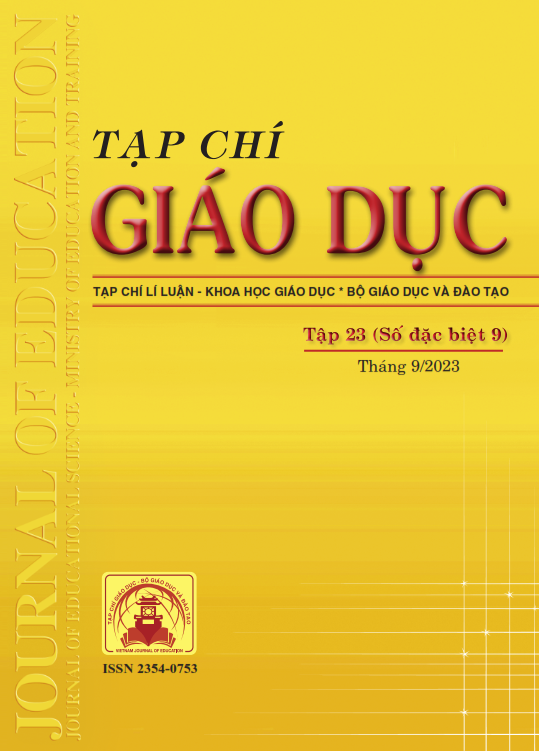Nghiên cứu về việc sử dụng các chiến lược siêu nhận thức trong viết bài học thuật của sinh viên Sư phạm Tiếng Anh tại Trường Đại học Sư phạm Hà Nội 2
Tóm tắt
Writing competence is one of the essential competences in the comprehensive development of each individual. However, the study of academic writing instruction is based on a metacognitive strategy for students majoring in pedagogy who, after graduation, will be directly involved in teaching writing skills to their own students, which has been neglected over the years. Therefore, the authors have carried out an empirical study to find out the influence of metacognitive strategy training on students' academic writing competence with the hope of finding the optimal teaching method for pre-service EFL teachers in colleges and universities of pedagogy. The mixed method was used to construct the experimental and control groups by pairing 44 first-year students (K48) majoring in English Language Teaching at Hanoi Pedagogical University 2. Reformulation and re-expression of ideas are herein expected in such a way that the sentences can be structurally well-formed, and will have more of the competence to plan, monitor and evaluate their own learning process and thus become effective learners. The authors recommend to further researchers that additional experimental studies be conducted to see whether metacognition techniques affect writing competence using proprietary scales.
Tài liệu tham khảo
Andrade, H. G. (1999). Student Self-Assessment: At the Intersection of Metacognition and Authentic Assessment. A paper presented at the annual meeting of the American Educational Research Association. Montreal, Canada.
Bai, R., Hu, G., & Gu, P. Y. (2014). The relationship between use of writing strategies and English proficiency in Singapore primary schools. The Asia-Pacific Education Researcher, 23, 355-365. https://doi.org/10.1007/s40299-013-0110-0
Bui, G., & Kong, A. (2019). Metacognitive instruction for peer review interaction in L2 writing. Journal of Writing Research, 11(2), 357-392. https://doi.org/10.17239/jowr-2019.11.02.05
De La Paz, S., & Felton, M. K. (2010). Reading and writing from multiple source documents in history: Effects of strategy instruction with low to average high school writers. Contemporary Educational Psychology, 35(3), 174-192. https://doi.org/10.1016/j.cedpsych.2010.03.001
De Silva, R., & Graham, S. (2015). The effects of strategy instruction on writing strategy use for students of different proficiency levels. System, 53, 47-59. https://doi.org/10.1016/j.system.2015.06.009
Flavell, J. H. (1979). Metacognition and cognitive monitoring: A new area of cognitive–developmental inquiry. American Psychologist, 34(10), 906-911. https://doi.org/10.1037/0003-066X.34.10.906
Graham, S., & Perin, D. (2007). Writing next: Effective strategies to improve writing of adolescents in middle and high schools - A report to Carnegie Corporation of New York. Washington, DC: Alliance for Excellent Education.
Graham, S., Gillespie, A., & McKeown, D. (2013). Writing: Importance, development, and instruction. Reading and Writing, 26, 1-15. https://doi.org/10.1007/s11145-012-9395-2
Guo, X., & Huang, L.-S. (2020). Are L1 and L2 strategies transferable? An exploration of the L1 and L2 writing strategies of Chinese graduate students. The Language Learning Journal, 48(6), 715-737. https://doi.org/10.1080/09571736.2018.1435710
Harris, K. R., Santangelo, T., & Graham, S. (2010). Metacognition and strategies instruction in writing. In H. S. Waters & W. Schneider (Eds.), Metacognition, strategy use, and instruction (pp. 226-256). The Guilford Press.
Kellogg, R. T. (2008). Training writing skills: A cognitive developmental perspective. Journal of Writing Research, 1(1), 1-26. https://doi.org/10.17239/jowr-2008.01.01.1
Liberty, L. M., & Conderman, G. (2018). Using the self-regulated strategy development model to support middle- level writing. The Clearing House: A Journal of Educational Strategies, Issues and Ideas, 91(3), 118-123. https://doi.org/10.1080/00098655.2018.1426303
O’malley, J. M., & Chamot, A. U. (1990). Learning strategies in second language acquisition. Cambridge University Press.
Pappamihiel, N. E. (2002). English as a second language students and English language anxiety: Issues in the mainstream classroom. Research in the Teaching of English, 36(3), 327-355.
Schraw, G. (1998). Promoting general metacognitive awareness. Instructional Science, 26, 113-125. https://doi.org/10.1023/A:1003044231033
Singh, R. R. (1991). Education for the twenty-first century: Asia-Pacific perspectives. UNESCO Principal Regional Office for Asia and the Pacific.
Todd, R. W. (2002). Using Self-Assessment for Evaluation. Forum, 40(1), 16-19.
Victori, M. (1999). An analysis of writing knowledge in EFL composing: A case study of two effective and two less effective writers. System, 27(4), 537-555. https://doi.org/10.1016/S0346-251X(99)00049-4
Xing, M., Wang, J., & Spencer, K. (2008). Raising students’ awareness of cross-cultural contrastive rhetoric via an e-learning course. Language Learning and Technology, 12(2), 71-93.
Yang, N.-D. (1999). The relationship between EFL learners' beliefs and learning strategy use. System, 27(4), 515-535. https://doi.org/10.1016/S0346-251X(99)00048-2
Zimmerman, B. J. (2023). Dimensions of academic self-regulation: A conceptual framework for education. In Dale H. Schunk & Barry J. Zimmerman, Self-regulation of learning and performance (pp. 3-21). Routledge.
Đã Xuất bản
Cách trích dẫn
Số
Chuyên mục
Giấy phép
Bản quyền (c) 2023 Tạp chí Giáo dục

Tác phẩm này được cấp phép theo Ghi nhận tác giả của Creative Commons Giấy phép quốc tế 4.0 .












